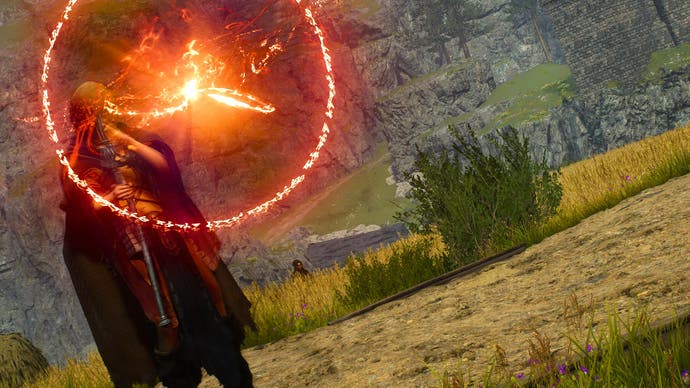Dragon’s Dogma 2 Mage best build, skills, and augmentations
An all-in-one package.
A world of fantasy is nothing without a little bit of magic and spellcasters. If casting lighting bolts while you levitate over the battlefield is what you’re looking for, then Mage might be the magical vocation for you in Dragon’s Dogma 2.
In this game, you have pure magical users, such as Mage and Sorcerer, or mixed vocations, such as the Magick Archer. The fair selection of Vocations present in Dragon's Dogma 2 is enough for you to find one that suits your playstyle best. By allowing you to unlock and level up all of them in a single character, the game proposes that you experiment until you find the one you have the most fun playing.
While usually spellcasters are all about hitting enemies hard with massive magic spells. However, this Vocation is more versatile than this and allows different playstyles. In this guide, besides a rundown on how to play Mage, you find Mage best build and which skills and Augmentations to run with it.
On this page:
How to play Mage in Dragon’s Dogma 2
The playstyle you adopt when playing Mage is directly related to the build you’re using. Mage is a versatile Vocation, mixing powerful attacks and support skills that allows you to cure and buff the group. It’s possible to focus only on damage or support but any of these approaches would hasness half of the Vocation’s kit potential. That’s why we want to play it as a support/battle Mage.
The basics of playing Mage in Dragon’s Dogma 2 is similar to any other magical class you might have encountered in other games. Mages aren’t supposed to be luring enemies and taking direct damage since they lack the fortitude of a Fighter or Warrior. In other words, positioning is important in case you want to play Mage.
As a spellcaster, you can take a big chunk of the enemy’s life with your spells. Which one to use depends on the situation. Flagration and Frigor are the best when dealing with groups of enemies, for example. Regardless of whether you’re facing multiple or only one enemy, positioning is crucial to effectively damage the enemy.
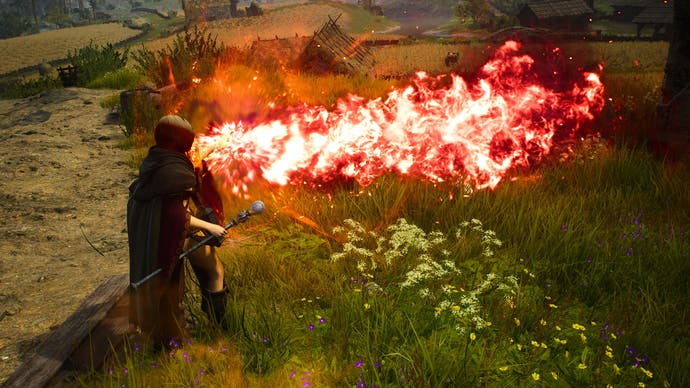
You can also take advantage of Levitate to reposition. As you fly over to a new place, it becomes easier to avoid getting bodied-block by enemies and running the risk of getting hit by their attacks.
When it comes to offering support to your group, depending on the skills you’re running, you can stay safe or you might need to get pretty close to danger. If you want to focus on using enchantments to buff the group's damage and give them shields, it’s easy to stay away from the center of the conflict.
However, other support abilities, such as Halidom and Anodyne either force your party to come to you or you need to get beside them, so they are affected by the field of healing. When facing large enemies, wait until their take down to cast these abilities near the boss and keep the up-time of the party.
Dragon’s Dogma 2 best Mage skills
Mage has a good selection of skills and picking the best ones will depend on the necessity and personal taste. You should always, however, equip two damage spells and two support spells. By following this division, the build has always some value regardless of the situation.
When choosing your support abilities, remember that Anodyne is a fixed Core Skill, so you always have a healing spell to use.
Below, you find the best Mage damage and support skills for you to choose from:
- High Flagration: Among the damage spells Mage has access to, this one is the best when it comes to dealing with enemies in mid-range combat. In more than one scenario, you find yourself close to enemies, either because they surround you or to cast Anodyne, for example. Take the opportunity to use High Flagration to distance yourself from enemies. This is an amazing spell to use in choke points.
- High Levin: If High Flagration is good for dealing with groups of enemies, High Levin is your best spell when fighting a single enemy, like dragons and cyclops. Getting close to attacking these enemies is too risky since they hit you pretty hard. High Levin allows you to attack enemies who are far from you, keeping you safe from their attacks.
- High Empyrean: Casting Empyrean creates a sphere of light in the air, dealing magic damage to enemies near and illuminating This is another good option when it comes to AoE magic spells although it is not as strong as Flagration. High Empyrean really shines during long periods of exploration when strolling during the night is the only option.
- Fire/Ice/Lightning Affinity: By enchanting your party’s weapons to cause elemental damage, you give them the upper hand against enemies since Dragon’s Dogma 2 has a system of elemental weaknesses. If you pick any of these abilities as one of your support spells, there is the necessity of studying the enemies you’re facing to know which is the best element to use.
- High Halidom: Alongside Anodyne, High Halidom is the bread and butter of your kit as a support. This skill creates a field that cures a long list of debilitation of those inside of it. While this spell has the same physical limitation as Anodyne, Halidom makes you less dependable on consumables to deal with situations like when your pawns catch fire or take time when waking up allies lying on the ground in the middle of a fight.
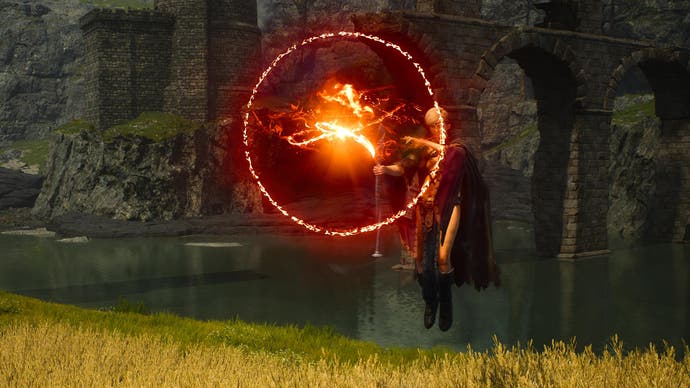
Dragon’s Dogma 2 best Mage Core Skills
The Mage’s Core Skills are part of or affect the basic abilities in the Vocation’s kit. Unlocking these abilities won’t necessarily allow you to cast a new powerful magic, but they improve basic aspects of your gameplay, such as basic attacks, cast time, and so on.
- Anodyne: You already start with Anodyne unlocked but we can’t ignore the potential of this core skill especially in the early stages of the game. By using it, you cover a small area around you that will heal anyone who’s inside. This is a healing-over-time type of ability, so you can’t use it to save a party member who is barely alive. Trying to weave Anodyne casts between damage skills is a great way to guarantee your party stays alive.
- Quickspell: Positioning is important when you’re playing Mage because casting spells takes time. The seconds you need for a casting to finish are enough for you to get hit by the Chimera’s breath attack or get smashed by a Cyclop. Quickspell turns all the casting abilities into almost instant skills, reducing the window enemies have to hit you when you try to use your skills. This core skill only affects the casting time and not the animation time.
- Levitate: This Core Skill allows you to hover in the air for a few seconds. You won’t fly to wherever you want, but it will give you enough room to reposition when you find yourself surrounded by enemies. It’s also a great exploration tool, assisting you in reaching higher places where regular jumps won’t be enough.
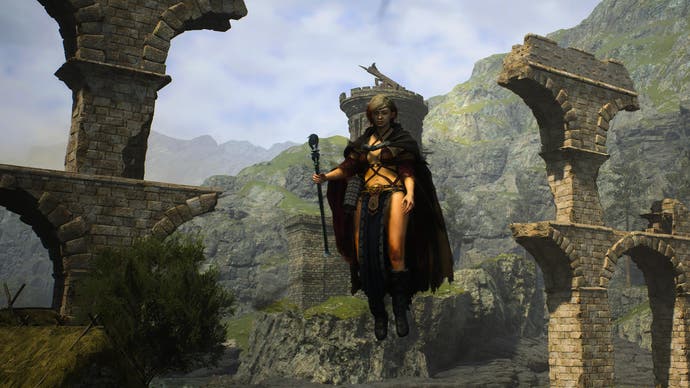
Dragon’s Dogma 2 best Mage Augmentations
Augmentations are passive abilities that improve different aspects of your character. A positive side of Augmentations is that they are shared between Vocations. Once you unlock them with their respective Vocation, you’re free to equip them with others.
Below you find the best Augmentations to use when playing Mage in Dragon’s Dogma 2:
- Beatitude: As explained, Mage is responsible for supporting the party with healing and protective skills. Because of that, Beatitude is a top priority Augmentation for this Vocation. You unlock it by leveling Mage up and it increases the amount of Health recovered with curatives and curative skills.
- Endurance: Most actions in the game require you to spend stamina from running to casting spells. With Endurance, you increase your maximum stamina which means, as a Mage, you can use more spells in sequence. You unlock this augmentation by leveling up Archer.
- Subtlety: In more than one scenario, Mage becomes an easy prey to enemies. To avoid the chance of becoming their target, you should consider Subtlety as one of your augmentations. It decreases the chances of you being targeted by enemies, which is extremely helpful to give you room to cast your spells. Subtlety is a Thief argumentation.
- Voracity: One of the Augmentations you get from Magick Archer, Voracity recovers some of your stamina when you deliver the killing blog to an enemy. Stamina works as the Mage’s mana in Dragon’s Dogma 2, so you should take any opportunity you have to keep casting spells. This Augmentation is great when fighting dangerous foes, like dragons.
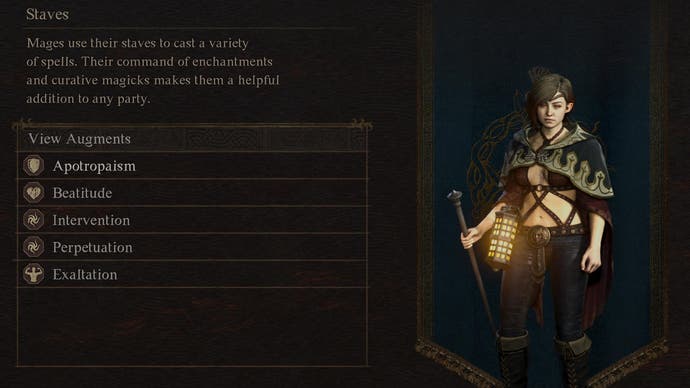
Enjoy leveling up and building the best Mage in Dragon’s Dogma 2.
